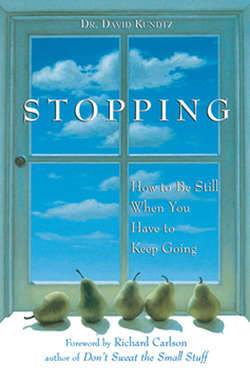Читать книгу Stopping - David Kundtz - Страница 16
На сайте Литреса книга снята с продажи.
ОглавлениеI am the rest between two notes. . . .
RAINER MARIA RILKE
9
Finding the Spaces Between the Notes
You'll notice that I quote poets quite a bit. I believe they are the ones of us who see most clearly. That's because they are always looking at life. So even though it may seem that they are difficult to understand (just what does Walt Whitman mean when he says “I loafe and invite my soul”?), their vision, once felt, is the clearest we have. So you will find me quoting people like Frost and Rilke, Neruda and Angelou, and the ancients, Horace and Cicero, because they are always looking at life, and looking leads to seeing what's there. Teilhard De Chardin, priest, paleontologist, and visionary, teaches that “the whole of life lies in the verb seeing.” So my goal with the poets is to help us see what they see.
Poets are the visionaries I turn to when I need to find my way, when I need to see a true and unadorned reflection of myself, or when I need to learn useful skills for my journey. The German poet Rainer Maria Rilke was a passionate and intensely personal poet. In the following poem he gives beautiful expression to the meaning of Stopping. It is from his Book of Hours, (10) (translated by Robert Bly):
My life is not this steeply sloping hour,
in which you see me hurrying.
Much stands behind me; I stand before it like a tree;
I am only one of my many mouths,
and at that, the one that will be still the soonest.
I am the rest between two notes,
which are somehow always in discord
for Death's note wants to climb over—
but in the dark interval, reconciled
they stay there trembling.
And the song goes on, beautiful.
What can we learn from this? In the first stanza, the poet tells us not to mistake his “hurrying,” fast-moving life (“steeply sloping hour”) for the authentic and deep life that is really his. No. His life is more, so much more, than that.
“Much stands behind me” represents all that he has to keep in his mind, to be aware of, and to remember, and “like a tree,” he stands there and embraces it all. In the wonderful line “I am only one of my many mouths,” the poet seems to ask us not to be fooled. Of all the things that he has said, only a few are really his. Of all the mouths from which he speaks, only one is authentic, and that one will be the first to be stilled. By death? By intimidation? By wisdom?
He is, he says, “the rest between two notes” of a song. Think of it. Think not of the beautiful, rich tones of the notes. Notes are what we hear, they are the wonderful things of our lives: the events and people. But “Death's note wants to climb over” or dominate, and thus the notes are “somehow always in discord.” Without the rest between, without the “dark interval” where values and meanings have their origins, the Death note would win. But it doesn't have to win. During the rest, life happens, value and meaning are given form, the soul deepens its reach, and the song is saved once again. And it goes on being saved again and again and again in all the pauses, long and short, of the song each of us is singing.
The poet asks that we do not define him as the rushing around that we see him doing, but that we should define him as the pause between the events to which and from which we see him rushing; because it is precisely during the pause that the quality of the notes, and his true life, is born.
The poet asks us to be, like him, the rest between the notes: that brief, measured moment between the time when one note of the music stops and another begins. Without that rest, all would be chaotic racket. “Death”—that is, distraction and forgetting— would dominate when all you fill your life with are the notes. All notes and no rests would be Babel. The sound would not be music; it would be more like a siren. But in the “reconciliation” of that “dark interval,” the song “goes on, beautiful” because it's there that all the notes become organized and melodic. It is there that they take on meaning and give value.
Here's a practical example for noticing the rests between the notes: You've jumped into your car after dropping off a package at the post office and are on your way to an appointment. You're thinking of what you just did or what you will soon have to do. Dropping off the package and your appointment are your “notes.” You do those well. You are busy getting the notes right. But what you likely miss is the right-now, the in-between, the time between the notes, the time in the car when you are going from one thing to another. That's the time I want you to notice. That's the time the poet calls valuable.
Pianist Artur Schnabel, in speaking of his music, makes this point exactly: “The notes I handle no better than many pianists. But the pauses between the notes—ah, that is where art resides!” It is also where the art of living resides and where we transform discordant noise into the music of our lives.
Stopping is taking notice of the space between the notes. Stopping is making the space between the notes important. Stopping is transforming the space between the notes into life-giving waking up and remembering.
